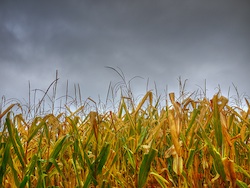The National Corn Growers Association (NCGA) is questioning the results of a recent study from Rice University and University of California that looked 40 years ahead at farming and climate change. The study finds corn ethanol has water issues that outweigh potential reductions in tailpipe emissions. In response, NCGA is saying they need to go back to the  “research table”.
“research table”.
“At a time when meteorologists struggle to tell you what the weekend will be like, it’s odd to see a report that tries to so specifically pinpoint the weather 40 years from now,” said NCGA President Pam Johnson. “But that’s only one of the problems we have with this very problematic study.”
The report, forecasts that the yield of corn grown for ethanol in the U.S. would be reduced by an average of seven percent over the next four decades, and the amount of irrigation needed for the corn would increase by nine percent.
Among its other flaws, Johnson noted:
- The report news release clearly states the bias of the authors, who “have long questioned the United States’ support of biofuels as a means to cut vehicle emissions,” the release said. It’s no wonder, then, that the report looks ahead a full four decades to criticize an ethanol policy, the Renewable Fuel Standard (RFS), which only cover renewable fuels for the next nine years.
- The report ignores any possible advances in technology to improve corn growing, such as new agronomic practices or technology. “Looking back 40 years, corn farming was so different in 1973 than it is today, and it’s a difference that could not have been predicted back then,” noted Johnson. “The fact of the matter is, it’s not only naive to assume that corn yield will not increase as it has been, but our current average yield is already sufficient to produce the five billion bushels needed to meet the full conventional RFS volumes.”

- Farmers have been successfully dealing with climate change on this continent for 2,000 years and have shown remarkable resilience and adaptation, Johnson said. Last year, even with a significant drought, they brought in the eighth largest crop ever and saw a significant yield increase compared to the last drought year. This shows that farming practices and tools will change to respond to changing conditions. Two examples offered by Johnson: Since 1980, corn farmers have reduced per-bushel greenhouse gas emissions by 36 percent – and irrigated water use by 53 percent.
Johnson added, “President Eisenhower once said that farming looks mighty easy when your plow is a pencil and you’re a thousand miles from the corn field. We encourage academics to get out of their ivory towers and learn what farmers are really doing, instead of simulating information that is basically useless.”

